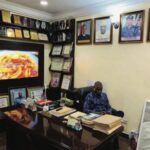The Money Laundering (Prohibition) Act 2011 (“The Act”) contains elaborate provisions for the combating of money laundering activities in the country. The Act gave a number of obligations to financial institutions and designated non-financial institutions geered towards achieving the objectives of the Act. For instance, there is the duty to verify identity of customers (Section 3), put in place adequate risk management systems (Section 3), make a declaration of activities to the Minister in charge of commerce where cash transactions are involved, and keep proper record where over $1,000 is involved (Section 5). Under Section 5, the Economic and Financial Crimes Commission (“Commission” or “EFCC”) shall have powers to demand and receive reports directly from designated non-financial institutions. There is obligation to financial institutions and designated non-financial institutions to mount special surveillance on certain transactions (Section 6). Section 10 mandates financial institutions and designated non-financial institutions to keep records and report to the EFCC of any single transactions, lodgment or transfer of funds in excess of N5M (individual) and N10M (body corporate), among other provisions.
The issue with lawyers
The issue is that Section 25 of the Act defines “Designated Non-financial Institution” to include legal practitioners. Section 25 provides that
“Designated Non-financial Institution” means “Dealers in Jewellery, cars and luxury goods, chartered accountants, audit firms, tax consultants, clearing and settlement companies, legal practitioners, hotels, casinos, supermarkets, or such other businesses as the Federal Ministry of Commerce or appropriate regulatory authorities may from time to time designate.
Clearly, legal practitioners were included in the list. But Nigerian lawyers acting under the umbrella of the Nigerian Bar Association (NBA) approached the court to challenge that section of the Act which included lawyers and succeeded up to the Court of Appeal. That was in the case of CBN v. Registered Trustees of the NBA (unreported) – CA/A/202/2015. It was held that legal practitioners are excluded from the definition of “Designated Non-Financial Institutions” as contained in the Act and that Section 25 of the Act is invalid, null and void as far as it applies to legal practitioners. The reason furnished was that Section 25 of the Act was held to be inconsistent with Section 192 of the Evidence Act, 2011. Section 192 of the Evidence Act provides for lawyer-client privilege. By this, a lawyer is not bound to disclose professional confidential communication between the lawyer and his or her client except the communication is made in furtherance of illegal purpose or where crime or fraud is involved.
Thus, the provisions of the Money Laundering (Prohibition) Act which gives financial institutions and designated non-financial institutions some disclosure obligations was held not to apply to legal practitioners.
The decision of the Court of Appeal has not been set aside. It is therefore valid and subsisting.
The EFCC’s back door attempt
Notwithstanding the fact that the decision of the Court of Appeal in CBN v. Registered Trustees of the NBA is still subsisting, the EFCC in F.R.N. v. Ozekhome [2021] 9 NWLR (Pt. 1782) 448 argued before the Court of Appeal that the trial Court in that case erred in law when it held that legal practitioners are excluded from the statutory list of “Designated Non-Financial Institution” contrary to the provisions of Section 25 of the Money Laundering (Prohibition) Act, 2011. U. U. Buhari, Esq. submitted on behalf of the EFCC that the role of the court is to interpret the law and not to amend same. This argument was in total and arrogant neglect of the earlier position of the Court of Appeal. The Court of Appeal in a decision delivered on 14 May 2021, discountenanced the submissions by the EFCC.
By the above argument, the EFCC appeared to forget that the role of parties is to abide by subsisting decisions of court which is valid until set aside. Similarly, the role of lawyers is not to mislead the court by attempting to appeal against a subsisting decision by irregular procedure. Counsel appeared to attempt to force a contrary decision to emanate from the same Court of Appeal in order to throw the law into confusion. Only the Supreme Court can review the position of the Court of Appeal in CBN v. Registered Trustees of NBA now upheld by the same Court in the case of F.R.N. v. Ozekhome. It is condemnable that the EFCC would move to forcefully box legal practitioners back into Section 25 of the Act after the Court of Appeal had earlier deleted them from the operation of that section of the Act.
In F.R.N. v. Ozekhome, the EFCC moved against the Respondent, a lawyer, (Chief Mike Ozekhome, SAN) by obtaining an interim order freezing the bank account of his law firm for receiving the sum of N75,000,000 as professional fees from the former Governor of Ekiti State, Mr. Ayodele Fayose. The Commission had argued that the Learned Senior Advocate ought to have known the funds were the proceeds of unlawful activities. It happened that at the time the transfer was made by the ex-Governor, his account which was earlier frozen by court order had been unfrozen by a subsequent court order. Chief Ozekhome successfully challenged the freezing of his account at the Federal High Court. EFCC appealed the decision and failed. The Court of Appeal found that in securing the interim order, freezing Chief Ozekhome’s account, EFCC suppressed the vital fact that as at the time the money was transferred to Chief Ozekhome’s Chambers, the account of Mr. Fayose had been unfrozen and that the ex-Governor had made a withdrawal of N5M from the account without any troubles. The Court also upheld the finding that Chief Ozekhome had dissipated the funds before his Firm’s account was frozen. The Court of Appeal restated the principle that it is not the requirement of the law that a legal practitioner would go into enquiry before receiving his fees from his client to find out the source of the funds from which he would be paid. There was no evidence that the money received by Chief Ozhekome was from the proceeds of unlawful activities.
It was in the heat of the arguments at the Court of Appeal that the EFCC argued that legal practitioners were captured by the disclosure obligations and statutory report to the EFCC as contained in the Act in their capacity as designated non-financial institutions. The Court of Appeal had no difficulty upholding the position that legal practitioners, though mentioned in the Act, are not bound. By judicial pronouncement, the name of legal practitioners appearing in Section 25 of the Act stands deleted. The courts have powers to strike down any statute or section or portion of the statute which is either unconstitutional or which reasonably offends another statute.
In conclusion, the decision of the Court of Appeal striking out the name of legal practitioners from Section 25 of the Act is a welcome decision which is valid and subsisting.














